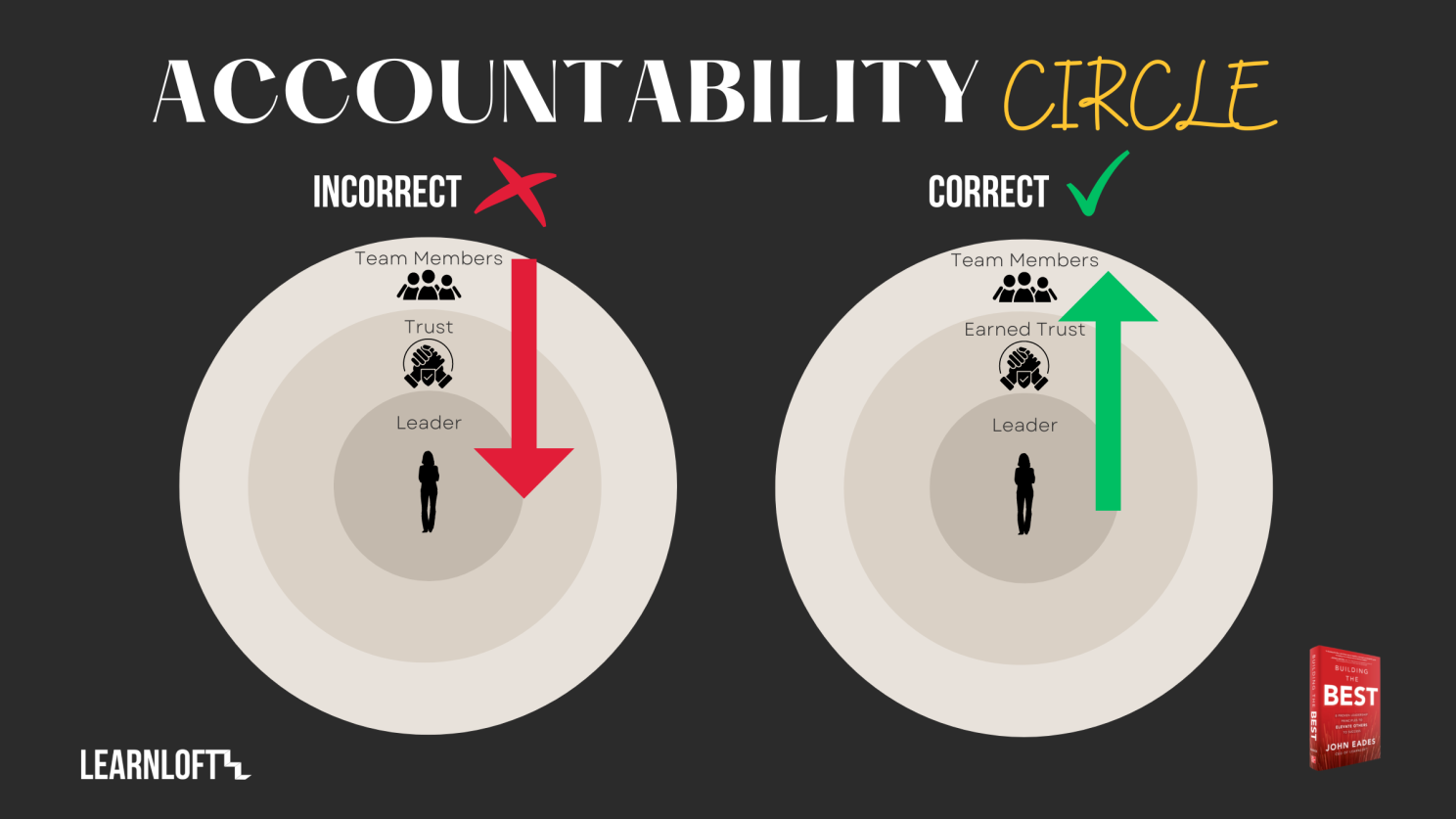Comments
- No comments found

Raising the level of accountability in a team is an essential element of sustained performance.
The lack of accountability is fully displayed when deadlines slip, excuses fly, blame is cast, or results disappear. Other times it's hidden in a cloud of complacency or a lot of words without actions.
Accountability is one of those words most people don't like because it makes them uncomfortable. The thought of being relentlessly responsible for yourself or holding someone else responsible for doing what they say they will do comes with a level of commitment most don't want.
The best teams and leaders aren't afraid of accountability and use it as a competitive advantage.
The best teams use accountability as a competitive advantage.
If elevating accountability on your team or organization is a top priority, know you are not alone. Based on preliminary research by LearnLoft, increasing accountability is a top three leadership objective in 2023. Since it's so important this year and beyond, let's start by getting on the same page about what it is.
Accountability is one of these words that has been hijacked. I define it in Building the Best as; the obligation of an individual or organization to account for its activities, accept responsibility for them and disclose the results in a transparent manner.
It is the obligation of leaders to account for their actions and the actions of their people.
No team has a perfect record of accountability, and no leader gets it right every time. So many leaders struggle with accountability because they think about the execution of it all wrong. Most managers think outside in instead of inside out.
Take the Accountability Circle from Building the Best as an example:

All accountability starts with a leader's willingness to invite accountability in their own life by entering into an agreement with themselves or others and following through on that commitment. Once leaders hold themselves accountable, they earn the right to hold others responsible.
Once you have demonstrated accountability in yourself and built trust-based relationships with team members, you are ready to hold others accountable. But the trick is to again think differently than most managers.
Instead of thinking about accountability as something you do to someone, think of it as something you do with someone. The best leaders understand accountability as a collaborative process to create more positive behaviors ongoing.
Accountability isn't something you do to someone, it's something you do with someone.
Research for the Leadership Style Free Quiz has shown accountability is one of managers' top 4 weakest leadership competencies, only behind listening, empathy, and communication. So clearly, if you struggle with accountability, you are not alone. So if you are ready to get better, follow these rules.
Joe Maddon, a successful Major League Baseball manager, has a unique way of leveraging accountability. When one of his players violates a team rule or isn't meeting a standard, he asks the player to purchase a nice bottle of wine, then they open it and have a glass or two in a one-on-one meeting. Thus he's stacking an uncomfortable conversation with someone comfortable while at the same time creating a deep sense of connection between himself and the player.
While this is a strategy only some leaders can use, Maddon understands this critical leadership lesson regarding accountability.
"Leaders must connect before they correct."
Said differently, "rules before relationships lead to rebellion." The stronger your relationship with team members, the easier it is to stack uncomfortable conversations with something comfortable.
One of leaders' most significant mistakes is not setting clear standards or assuming people know them. By definition, standards define what good looks like. The way I want you to think about them is slightly different. The best leaders don't define what good looks like; they define what great looks like.
The best leaders don't define what good looks like; they define what great looks like.
When you define what great looks like for your team and communicate it correctly, these standards will produce behaviors and habits that are vital to achieving results.
They also become the foundation for what you hold your people accountable to. Without their presence, it's nearly impossible to be effective.
The quickest and best shortcut to raise the level of accountability on a team is to turn conversations into action items. Last week at the end of a Coaching for Excellence workshop in Atlanta, an experienced District Manager approached me and said, "I have been so frustrated telling team members what needs to be done, and when I came back days later, it's not done. While closing a conversation with defined action items seems simple, it was a clear gap in my leadership approach."
Even good and experienced leaders can fall victim to assuming people will make changes on their own. The remedy for this is asking, "when do you plan to get it done?" Their answer is what we call "AAI's, an acronym for "accountability action items." Use AAI's to follow up and follow through.
The best part about raising accountability on a team is that it will produce improved results. But accountability is challenging, and it doesn't happen by itself. However, if you embrace the accountability circle, build strong relationships, set clear standards, and turn conversations into action items, you will be shocked at how effective your team will become.
John is the CEO of LearnLoft, author of, F.M.L. Standing Out & Being a Leader and host of the 'Follow My Lead' Podcast. He writes or has been featured on Inc.com, LinkedIn Pulse, TrainingIndustry.com, eLearningIndustry.com, CNBC Money, and more. John completed his education at the University of Maryland College.
Leave your comments
Post comment as a guest